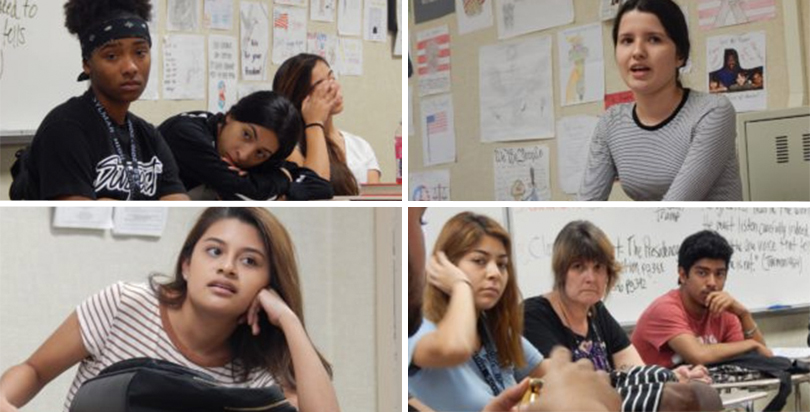Anxiety in L.A. Schools: What the Day After the Election Was Like at the Mostly Latino Sylmar High

Donald Trump was now the president-elect, and Lee recalled how his students had reacted with fear to some of the rhetoric during the presidential campaign about immigration, deportation and “the Wall.”
Sylmar Charter High School in the north San Fernando Valley has a student body that is 94 percent Latino, 81 percent socioeconomically disadvantaged and 25 percent English-language learners. So Lee quickly sent out a memo to all the teachers. At 9 a.m., he announced over the intercom that teachers should read it and pay attention.
In the memo, titled “Election Results,” Lee wrote, “We may have many students who show signs of anxiety particularly around the issue of immigration. If you see that students are seriously distressed, to the point that they are impaired, please refer them to the counselors.”
Lee suggested the teachers hold a check-in circle but not start a debate. He suggested history teachers begin conversations on how government works, the next steps and the Supreme Court and show students how “their voices should continue to shape the decisions that our government makes.”
In one 12th-grade government class, students rated their own anxiety levels. The average was 8 on a scale of 1 to 10. Across campus at an English-language-learners class, the anxiety levels were off the charts, with some students calling out numbers like 11 or 12.
A special education student who was headed to class ran up to the principal and high-fived him, saying, “I’m not worried, I am for Trump. I am an American.” Another student in the front office wondered aloud if President Obama would have to leave the White House that day.
“This week we are looking for students who may have certain levels of anxiety,” Lee said. They may be crying, alienated or acting out. Lee had five counselors on alert all day to deal with his 1,700 students.
Even at his own home, Lee’s 10-year-old son, Nathan, watched some of the election returns along with his 13-year-old and 9-year-old siblings. Nathan expressed some concern about a war starting. “He was concerned about Trump starting a war with Syria, and he couldn’t sleep,” Lee said. “I was surprised he was paying that much attention.”
LA Unified School Board President Steve Zimmer knew about the potential anxiety across the school district and said in a statement, “We know there may be feelings of fear and anxiety, especially within our most vulnerable communities. With emotions running high, our schools will continue to be the anchors of our neighborhoods. We ask our teachers and school leaders to continue their amazing work of listening to our students and striving together to assure that public education is the great civil rights engine of democracy.”
Zimmer noted that there are support teams to help every school and added, “The work with our families to fulfill the American dream continues today.”
In Laura Tracy’s 12th-grade government class at Sylmar High, she put the students in a circle to pass around a talking stick and check in on their concerns. She wrote a quote from President Harry Truman on the board and played some of the news reports of the election coverage.
“Overnight the students texted me,” Tracy said. She showed one message on her phone reading, “Ms. Tracy, are we going to talk about this tomorrow in class? Everyone is pissed.”
One student talked about how he helped at a polling booth. Another student, Ana Gascon, got to vote for the first time, but she was worried after hearing the results.
“I voted for Hillary Clinton, but I continue to be worried for my family,” said Gascon, 18, whose father is in the hospital and whose mother is in Mexico. “I talked to my mother on the phone this morning, and she knows that I get a little nervous about things, and she told me to calm down, don’t get so excited and to think positive. I am worried for my dad, though.”
Francisco Navarro, 17, said he doesn’t agree with some of Trump’s statements, but he is a Trump supporter. “I’m pretty happy that he won. I don’t think it will be as bad as everyone thinks,” he said.
“Look, when Obama became president, everybody was so afraid of what he was going to do and it turned out all right,” Francisco said. “I don’t agree with what he said about ‘all the people coming over are rapists and murderers’ because we know that’s not true. But when I looked at all the things that were being said, I felt like I came down on the side of the Republicans.”
African-American student Dior Parks said from across the room, “Look, Cisco, we are friends, and I don’t understand how you can support a man like that with all the disrespectful things he has said about us,” she said, pointing to Trump’s picture on an overhead screen. “I’m not able to handle that yet as our president.”
Next to her, her friend Paola Vazquez buried her head on her desk and said, “He has been very mean, and it makes me very worried.”
Next to her, Kimberly Peralta added, “It is going to be hard for the next four years, maybe even more.”
Stephanie Tovar said that the results of the election and the ensuing anxiety all make her want to get involved in politics. “I want to be able to vote, and I want to help make these decisions. I know that all the people who supported Trump are not all racists, but this election makes me excited about voting.”
Lourdes Sanchez added, “Young people should be more involved in the process, and they should appeal to youth more. This is our future. But I do have some concerns about the future now.”
Across campus in Maritza Hernandez’s English Learner Development class, the 14-to-18-year-olds in the class all said they had talked to their families about the election the night before and in the morning before they came to school. They all also were aware of being able to go to counselors to discuss their anxieties, but most of them said they would rather talk to their teacher first.
“I am worried, but we need to see what he really does,” said Monica Lemus, wearing a UCLA shirt, as Wednesdays are “College Awareness Day” at the school. Lemus hopes to attend UCLA someday, but she isn’t sure Trump will help her toward her goal. “I don’t know if I trust what he will do.”
Sitting behind her in class, Mario Guzman said, “It is not good that he will be president, and it will not be good for all of us. He wants to separate our families.”
The whole campaign and election have motivated Jose Lopez not only to vote but to become a politician. “I would like to help out and run for office someday,” he declared. His classmates cheered.
Hilda Lopez said, “It is not fair. He is making everyone worried that he will send everyone back. He is always talking about the wall and how Mexico will pay for it, but they won’t do it.”
Randolfo Rosales chimed in, “Don’t worry about the wall. We will get around it, we will jump over it. Don’t worry about that.”
And Gerardo Piedra said he was concerned about how Trump will handle immigration. “What will happen if he finds parents have come over illegally, and what if there are children who are legal?” he asked. “What is going to happen? That’s my worry.”
Get stories like these delivered straight to your inbox. Sign up for The 74 Newsletter

;)
